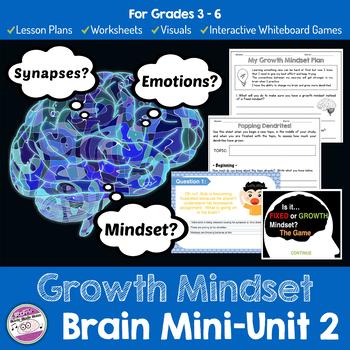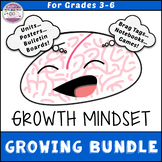Growth Mindset Brain Unit 2 Lesson Plans
- Zip
Also included in
- This bundle includes both of my popular Brain Mini-Units 1 & 2 at more than 10% off.For individual descriptions/feedback, click on the following links.• Growth Mindset Brain Unit 1 Lesson Plans• Growth Mindset Brain Unit 2 Lesson PlansCheck out my other Growth Mindset resources.Price $13.00Original Price $16.00Save $3.00
- This bundle includes ALL of my current and future growth mindset resources at a HUGE savings. As this a "growing" bundle, the price will go up as I add new products. However, a single purchase now, entitles you to all future releases for free.Updated on 7/14/2023For individual product descriptionsPrice $40.00Original Price $56.50Save $16.50
Description
Why I Made this…
I was inspired to make this 2nd mini-unit after I finished teaching my 4th and 5th graders my original “Growth Mindset Brain Mini-Unit”. They were so excited to learn about the brain and wanted to know more! Some kids even asked to learn about synapses. Teacher heaven!
I was also inspired from seeing many of my students become easily frustrated when they face difficulty and I wanted to show them that the way they deal with their emotions can actually affect their brain and ability to learn.
What’s This About…
* So, this Mini-Unit is designed to be an extension of my first (check it out), introducing new concepts like Synapses, Emotions, and Fixed & Growth Mindset Comparisons. But, you can still use it effectively without teaching the original unit.
* All lessons are intended for the busy teacher and should take approximately 20-25 minutes each. You can do one lesson a day or spread them out and do one per week (which is what I do).
Mini-Unit Includes:
-----------------------------------------------
Lesson 1: What is Growth vs. Fixed Mindset?
• PowerPoint Game: Growth vs. Fixed Mindset
• Essential Question Poster and Word Wall Posters: Growth Mindset and Fixed Mindset
Lesson 2: Growing Dendrites = Learning
• 3 Visual Slides
• Worksheet: “Popping Dendrites” Self-Assessment - Awesome way for students to track how many dendrites they have on any topic throughout the learning process! You can use this sheet with any subject!
• Essential Question Poster and Word Wall Posters: Neurons and Dendrites
Lesson 3: Synapses: Learning Something New Can Be Hard At First
• 4 Visual Slides
• Link to short video clip about Synapses and Learning
• Synapse Exit Ticket: “Show What You Know”
• Essential Question Poster and Word Wall Poster: Synapse
Lesson 4: Emotions and Learning
• 3 Visual Slides
• PowerPoint Game: “Emotions and Learning”
• Essential Question Poster and Word Wall Posters: Adrenaline and Endorphins
Lesson 5: My Growth Mindset Plan
• Directions for the “Ball Toss” Review Game
• Worksheet: “My Growth Mindset Plan”
• Essential Question Poster
* All Visual Slides now have Interactive Activities, Movement, and/or Discussion Questions built into each slide.
* Lesson Plans for each lesson including Common Core State Standard Connections.
**NOTE**: If you have any technical difficulties with the PowerPoint games please do not rate this resource poorly. Please leave a question in the Q&A section and I will be happy to help you! Thank you!
-----------------------------------------------------------------------------
Check out my other Growth Mindset resources.







